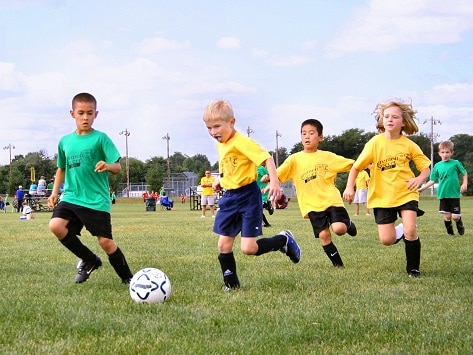
 A new study from Queen’s University in Kingston, Ontario, finds that children from “non-traditional” family structures are less likely to participate in organized sports.
A new study from Queen’s University in Kingston, Ontario, finds that children from “non-traditional” family structures are less likely to participate in organized sports.
The study compared involvement in sports for children coming from different family arrangements including single-parent families and reconstituted families (with either a step-parent or parent’s partner). The results showed that fewer children from so-called non-traditional family structures were involved in organized sports.
“Organized sport participation differed between youth from traditional and non-traditional families and this difference was similar in magnitude regardless of whether the youth were from single-parent or reconstituted families,” say the study’s authors.
Researchers found that this result was partially explained by the correlation between lower socioeconomic status and non-traditional family structures but that other factors were also responsible for the discrepancy, including access to sports facilities and parental and co-parent support for sport-related behaviours.
According to Stats Canada, lone-parent families and multiple-family households are on the rise and single-parent homes increased by eight per cent between 2006 and 2011. As of 2011, single-parent families made up roughly 16 per cent of Canadian families while reconstituted or step-families represented around 10 per cent of families.
There was one factor within the non-traditional category that seemed to impact participation: the regularity of visitation with the child’s other parent. Children from so-called traditional families were found to participate in organized sports at rates of 59.3 per cent for boys and 53.6 per cent for girls. For children from reconstituted and single-parent families where visitation from the other parent was on an irregular basis, the numbers were in the low 40’s for boys and high 30’s for girls.
The study was based on data retrieved from the 2009-2010 Health Behaviour in School-aged Children (HSBC) survey, a nation-wide survey conducted every four years in 43 countries around the world in collaboration with the World Health Organization. The 2009-2010 Canadian HSBC surveyed over 26,000 children aged 11 to 15 years and was funded jointly by the Public Health Agency of Canada and Health Canada.
The size and shape of the Canadian family has been changing drastically over the past few decades, with the variety in parenting arrangements being a significant factor. According to the last Statistics Canada report in 2011, lone-parent families and multiple-family households are on the rise and single-parent homes increased by eight per cent between 2006 and 2011. As of 2011, single-parent families made up roughly 16 per cent of Canadian families while reconstituted or step-families represented around 10 per cent of families.
Along with these changes, other big movers have been the upsurges in both one-person households in Canada and couples without children. Stats Canada reported that 27.6 per cent of all homes in 2011 were one-person and that for the first time on record there were more couples without children than couples with children (42.7 and 41.4 per cent of all families, respectively).
Along with financial incentives such as the federal government’s Children’s Fitness Tax Credit, the study’s researchers contend that programs attempting to increase children’s physical activity and sports participation should also consider approaches that target non-traditional families.
The study is currently available online in the scientific journal PLoS One.
Leave a Reply
You must be logged in to post a comment.



 Share
Share Tweet
Tweet Share
Share




Comment